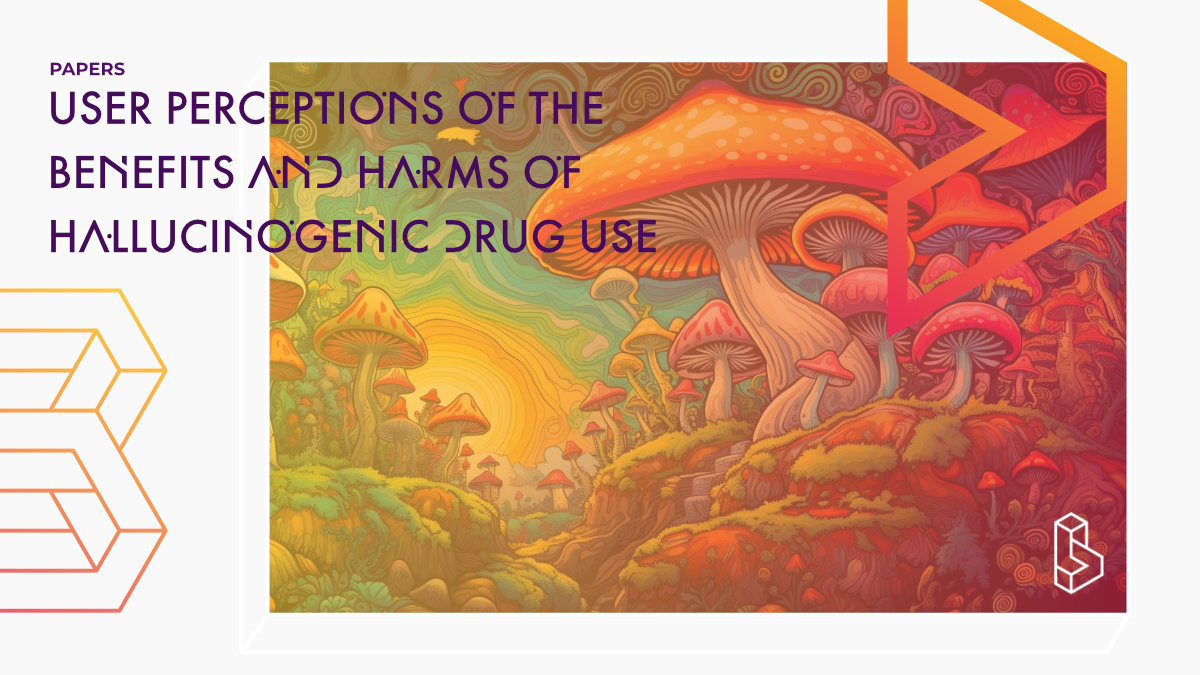This survey study (n=626) investigated user perceptions of the benefits and harms of using LSD, psilocybin, MDMA, cannabis, ketamine, and alcohol. Overall, LSD and psilocybin were regarded as having the most positive impact on well-being and the least harm in terms of physical and mental health.
Abstract of User perceptions of the benefits and harms of hallucinogenic drug use
“Introduction: This study used a web-based questionnaire to investigate user perceptions of the benefits and harms of hallucinogenic drug use. Over 600 forms were submitted.
Methods: Users were asked to comment on the acute and prolonged effects of different drugs and to provide more specific information on how particular drugs have harmed and/or helped them.
Results: Subjects reported relatively less harm associated with the classic hallucinogens, LSD and psilocybin, than other drugs specifically focused on in the questionnaire (MDMA, cannabis, ketamine and alcohol). A wide-range of benefits was reported, including: help with mood disorders, addictions and migraine as well as more general long-term improvements in wellbeing. Symptoms of hallucinogen persisting perceptual disorder were reported by a number of subjects and these were most closely associated with use of LSD; however, few users regarded these effects as troubling. Eighty-one per cent of users reported having had a ‘spiritual experience’ on a hallucinogenic drug and over 90% considered ‘access to the unconscious mind’ to be a specific property of the classic hallucinogens.
Discussion: With caution, these findings support recent calls for a systematic investigation of the therapeutic potential of the classic hallucinogens and highlight the scope for empirical investigations of spiritual and psychodynamic phenomena.”
Authors: Robin L. Carhart-Harris & David J. Nutt
Summary of User perceptions of the benefits and harms of hallucinogenic drug use
A web-based questionnaire was used to investigate user perceptions of the benefits and harms of hallucinogenic drug use. The results showed that users reported relatively less harm associated with the classic hallucinogens, LSD and psilocybin, than other drugs specifically focused on in the questionnaire.
This study used a web-based questionnaire to collect information on the perceived benefits and harms of drug use, with a particular focus on hallucinogenic or ‘psychedelic’ drugs. It also sought to address uncertainties regarding the prevalence of flashback phenomena and/or ‘hallucinogen persisting perceptual disorder’.
Find this paper
https://doi.org/10.3109/14659890903271624
Open Access | Google Scholar | Backup | 🕊
Cite this paper (APA)
Carhart-Harris, R. L., & Nutt, D. J. (2010). User perceptions of the benefits and harms of hallucinogenic drug use: A web-based questionnaire study. Journal of Substance Use, 15(4), 283-300.
Study details
Topics studied
Safety
Equity and Ethics
Study characteristics
Survey
Participants
626
Humans
Authors
Authors associated with this publication with profiles on Blossom
David NuttDavid John Nutt is a great advocate for looking at drugs and their harm objectively and scientifically. This got him dismissed as ACMD (Advisory Council on the Misuse of Drugs) chairman.
Robin Carhart-Harris
Dr. Robin Carhart-Harris is the Founding Director of the Neuroscape Psychedelics Division at UCSF. Previously he led the Psychedelic group at Imperial College London.
Institutes
Institutes associated with this publication
Imperial College LondonThe Centre for Psychedelic Research studies the action (in the brain) and clinical use of psychedelics, with a focus on depression.
Linked Research Papers
Notable research papers that build on or are influenced by this paper
Prediction of hallucinogen persisting perception disorder and thought disturbance symptoms following psychedelic useThis prospective cohort study (n=654 start, n=212 end) investigated delusional ideation, magical thinking, and HPPD symptoms in participants before and after planned psychedelic use. Results showed reduced delusional ideation after one month, no changes in magical thinking, and HPPD-like effects in 30% of participants (though rarely distressing at <1%), with younger age, female gender, psychiatric history, and baseline trait absorption predicting HPPD-like effects.

